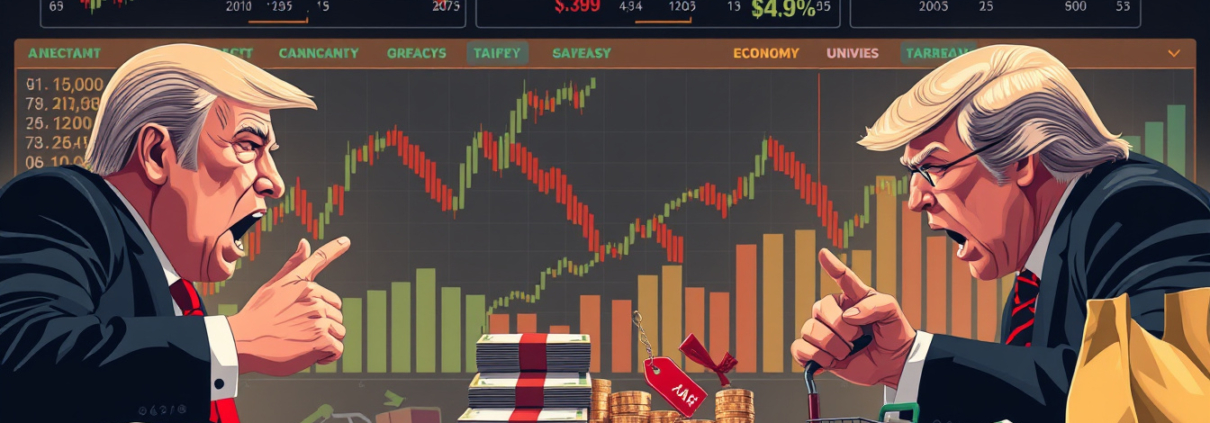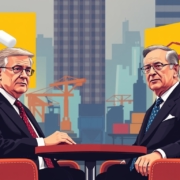Trump vs. Goldman: The Economic Fallout of Rising Tariff Inflation
Economists Warn of Rising Tariff-Driven Inflation as Trump Criticizes Goldman Sachs
Tariffs and inflation now drive many talks. Economists on Wall Street agree that tariffs will raise consumer prices soon. Recent consumer price data look upbeat. Tariffs, however, will push prices up. Goldman Sachs said prices affected by tariffs will increase. This view upset many, including former President Donald Trump. Many experts share this warning.
Goldman Sachs Faces Backlash Amid Broad Consensus
Goldman Sachs sparked conflict when its economists showed that tariffs will hit consumers harder in the second half of 2025. Trump shared his anger on Truth Social. He told CEO David Solomon to fire the economist behind the study or to leave the job himself.
Goldman Sachs economist David Mericle spoke on CNBC. He said, "If we fired every economist who shares this view, Wall Street would soon have many empty seats." His words keep market views close and simple.
Wall Street Economists See Inflation Creeping Upward
Many economists see a steady rise in prices. Companies use up cheaper stocks and then pass on the high cost of tariffs. Tariff rates climbed from 3% to almost 18% this year. Soon, consumers will see higher bills.
• Michael Feroli of JPMorgan Chase says tariffs may take 1% off the economy and add 1% to 1.5% to inflation.
• Brian Rose, a senior economist at UBS, sees core inflation stop falling as tariffs push store prices higher; he notes that slowing shelter costs and a consumer check might limit the jump.
• Pantheon Macroeconomics watches core inflation climb 1 percentage point, reaching 3.5% by year-end.
• PNC chief economist Gus Faucher sees core PCE inflation rising above the Fed’s target soon.
Most experts see no wild inflation. They expect a slow rise of 0.3% to 0.5% each month. This rise may place core inflation in the low- to mid-3% range.
Impact on Federal Reserve Policy and Consumer Spending
The rise in inflation will affect the Fed’s plans. With price pressures growing, many economists think:
• The Fed may wait to cut rates, starting later as the job market drops and if inflation seems brief.
• Higher prices may slow down how much people spend. This change could also slow economic growth for the rest of the year.
• JPMorgan projects that tariffs might lower GDP growth by nearly 1%, while the Blue Chip Economic Indicators report shows about 0.85% growth in the second half of 2025. —
Near-Term Concerns and Inflation Stickiness
Some risks may push inflation higher. On August 29, the tariff break for goods under $800 ends. This rule change may raise retail prices.
Other worries are that some prices move slowly. Rent, insurance, and home items change over longer periods. The Cleveland Fed measured sticky-price CPI inflation at a 3.8% yearly rise. This level is the highest since May 2024. It shows that price increases persist in some areas, even when food and energy do not change as much.
BNP Paribas notes that inflation may spread. Service prices also show upward moves. The key worry for the Fed is if high prices will stay for a long time.
Summary of Expert Views on Tariff Inflation Effects
• Tariffs may drive inflation up by 1 to 1.5% and reduce GDP by about 1%.
• Core inflation may rise slowly, reaching about 3.5% by year-end.
• The Fed may hold off on rate cuts until it sees that price rises are short-lived.
• Ending tariff breaks might push store prices higher.
• Slow shifts in some prices could lead to lasting cost increases.
Conclusion
Experts share one clear message. Tariffs seem set to push inflation higher soon. This shift will challenge both buyers and policy makers. Trump’s anger at Goldman Sachs shows the tight politics around this trend. Yet, the firm’s forecast fits many Wall Street views. In the coming months, buyers should get ready for modest price hikes, especially for items hit by tariffs. Investors and policy makers now watch as these changes shape economic growth and Fed moves.
For continual updates on inflation, tariffs, and market reactions, stay tuned to CNBC.









